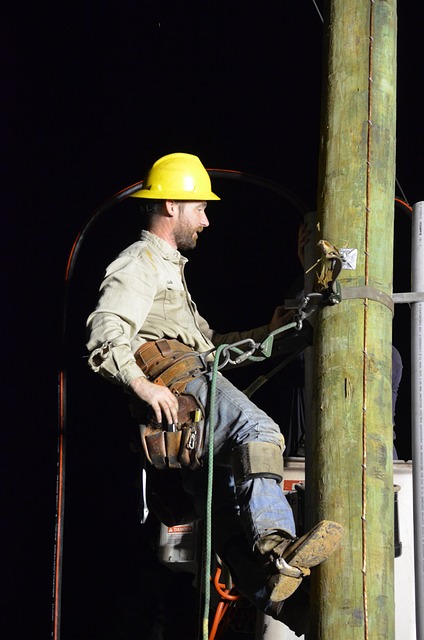 If you like to work outdoors, are physically fit, not afraid of heights and can deal with a little danger, an electrical power line installer and repairer may be just the job for you.
If you like to work outdoors, are physically fit, not afraid of heights and can deal with a little danger, an electrical power line installer and repairer may be just the job for you.
It’s a job that’s in demand and offers a large number of apprenticeships – more than 15,000 active apprenticeships in 2022, according to the U.S. Bureau of Labor Statistics. It also pays quite well, with a median annual pay of $74,530 per year or $35.83 per hour in 2021.
Power line installer job description
Just what does an electrical power line installer and repairer do and what kinds of skills do they need?
They work on the installation, maintenance or repair of electrical lines and also need to know how to inspect and test them. Dealing with heights may be an integral part of the job, since workers have to climb poles and transmission towers. Many lines are now installed underground, so the job also involves digging trenches.
Line installers and repairers may be called to work at any time of the day or night – and sometimes in extreme weather – to help solve power outages. The job also requires an extensive knowledge of safety procedures, since workers are exposed to high voltage electricity.
Since power systems can be quite complex, some people who do this type of work specialize either in installation or repair, and there’s plenty of work for both of these.
While most electrical power line installers work for local electric companies, some work in construction and for local governments.
How to get a job as an electrical power line installer
A job as an electrical power line installer only requires a high school diploma, but to get one it’s necessary to go through a training program or apprenticeship. Applicants also have to be proficient in algebra.
One path to employment is through education. Many community colleges offer programs in this field. Here are just a few examples:
Tri-County Technical College – Tri-County Technical College in Pendleton, S.C., offers a 12-week Power Line Worker Certification program that can lead to a job.
Northwest Iowa Community College – Located in a small town equidistant between Sioux Falls and Sioux City, this community college has created a program known as Powerline. Students study on campus and do field work for two semesters and a summer session. After completion, many are hired by electrical utility companies, rural electric coops and construction companies. Iowa residents can apply for free tuition through the Future Ready Iowa Scholarship, which pays for programs, including this one, that result in high-demand jobs.
Western Nebraska Community College – The Powerline Construction & Maintenance Technology program at the Western Nebraska Community College provides education that leads to an associate degree, certificate or diploma in Powerline Construction & Maintenance Technology.
Southwest Texas Junior College – This junior college’s Powerline Technician Program is a 14-week course that prepares students for an apprenticeship. It includes 10 weeks of classroom and practical training and four weeks of truck driver training leading to a commercial driver license.
Chandler-Gilbert Community College – With multiple campuses in Maricopa County, a county that includes Phoenix, Chandler-Gilbert CC offers a two-year associate degree in Electric Utility Technology.
These programs will give you an idea of what’s available, but if you don’t live in an area where any of the community colleges listed are located, search the internet for something close to where you are located. If you can’t find one, you can always apply for a program as an out-of-state student. Although the tuition will be higher, it could lead the way to a well paying job.
Also, be sure to check with the energy companies that hire electrical power line installers in your area and see what they suggest for education and training and career launch ideas. Many work with community colleges and vocational schools to help create pipelines of future hires. Searching on Indeed and ZipRecruiter for electrical power line installer jobs could also help to uncover these employers.
IEBW-NECA apprenticeships provide opportunities
Unlike the community colleges, which require tuition, apprenticeships pay people to work while they learn. The International Brotherhood of Electrical Workers (IBEW) and the National Electric Contractors Alliance (NECA) sponsor an electrical training alliance that oversees a variety of electrical-related apprenticeships. Ten training centers operated by local Joint Apprenticeship and Training Committees cover the U.S. Since each operates in a slightly different way, check out the website for your area.

